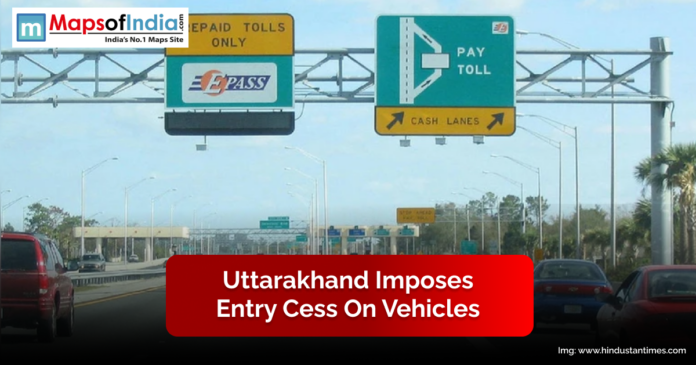The government of Uttarakhand has declared that soon vehicles entering the state will be required to pay a green cess, and this move will go a long way in curbing the increasing pollution levels and managing the increasing number of tourists visiting. The new rule is expected to control the entry of vehicles from other states and, at the same time, earn some revenue to support environmental protection and the development of infrastructure. That system should be in effect from December 2025, and it will cover practically all vehicles entering Uttarakhand via the specified border check-posts.
Under the new policy, non-Uttarakhand vehicles will have to pay a fixed sum of cess, which would automatically be deducted via their FASTag system. ANPR cameras will be used at strategic entry points to scan the vehicles and charge them using electronic payments. This action will aim at streamlining the system and eliminating the delays at the borders manually. The amount of the cess is likely to vary between 20 and 80, depending on the type of vehicle – heavier and commercial vehicles will pay higher.
This new rule, however, will not apply to all vehicles. The government has declared electric, hydrogen, CNG and solar-powered motor vehicles exempt from taxes with two-wheelers and other essential services vehicles, such as ambulances and fire trucks. The concept is to promote the use of green and clean energy vehicles, and also to reduce the environmental impact of transport that is fuel-based. This development is being considered as an extension of a wider sustainable mobility drive in the hill state that has been experiencing an influx of vehicular traffic as a result of tourism and pilgrimage trails.
The beautiful yet fragile ecosystem in Uttarakhand has been facing an intensifying stress due to unchecked tourism and automobile emissions. In recent years, towns like Dehradun, Rishikesh, Nainital and Mussoorie have been reported to experience alarming rates of air pollution, particularly during the peak tourism seasons. The green cess not only will control this increasing menace, but will also finance initiatives of road dust cuts, garbage recycling, and environmentally friendly infrastructure. Authorities feel that this plan will create a balance between tourism and the conservation of nature.
Although the given amount of the cess might be considered insignificant, it might also have a more widespread influence on tourist traffic and commercial transport. Repeat customers and tour operators might experience a rise in operational costs of operation. Nevertheless, the move has received a warm welcome from the environmentalists, who have said that such actions are needed to preserve the sensitive Himalayan environment of Uttarakhand. As the green cess will be implemented in the near future, tourists as well as transporters will have to work with this new environmentally-friendly travel regulation.










